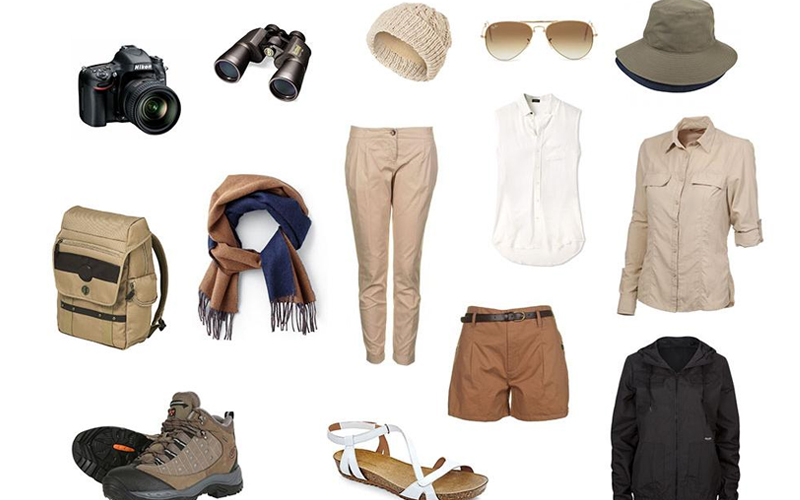Embarking on a safari in Tanzania is an exciting adventure, promising breathtaking landscapes, incredible wildlife, and memorable cultural experiences. To make the most of your trip, packing the right items is essential. This guide will help you prepare for your Tanzanian safari by outlining the must-have items for a comfortable and enjoyable journey. From clothing and accessories to gadgets and health essentials, we’ve got you covered.
Clothing
- Lightweight, Neutral-Colored Clothing: When on safari, it’s important to blend in with the environment to avoid startling the animals. Pack lightweight, neutral-colored clothing such as khaki, beige, and olive green. Avoid bright colors and dark shades, as they can attract insects and make you more noticeable to wildlife. Neutral colors are not only practical but also help in regulating body temperature, as they reflect sunlight rather than absorb it. Additionally, consider the material of your clothing; breathable fabrics like cotton and moisture-wicking materials are ideal for keeping cool during hot days and warm during chilly mornings and evenings. Long-sleeve shirts and long pants can protect you from the sun and insect bites, ensuring you remain comfortable throughout your trip.
- Layered Clothing: Tanzania’s weather can vary greatly throughout the day. Mornings and evenings can be chilly, while afternoons are typically hot. Pack layered clothing to stay comfortable, including long-sleeve shirts, t-shirts, lightweight fleece or jackets, and convertible pants that can be zipped off into shorts. This approach allows you to add or remove layers as the temperature changes, ensuring you are always dressed appropriately for the conditions. Layers also provide versatility in your wardrobe, reducing the overall amount of clothing you need to pack. A lightweight rain jacket is also recommended, especially during the rainy season, as it can protect you from sudden downpours and wind.
- Comfortable Footwear: Comfortable, sturdy shoes are a must for a safari. Opt for hiking boots or sturdy walking shoes for game drives and walking safaris. These shoes provide the necessary support and protection for traversing uneven terrain and can withstand the rugged conditions often encountered on safari. Additionally, bring a pair of sandals or flip-flops for relaxing at the lodge. These are ideal for walking around camp or for use in communal showers. Remember to break in new shoes before your trip to avoid blisters and discomfort. Proper footwear can make a significant difference in your overall comfort and enjoyment of the safari experience.
- Hat and Sunglasses: A wide-brimmed hat and sunglasses are essential to protect you from the sun. Choose a hat with a chin strap to keep it secure during windy conditions. A hat with a wide brim provides shade for your face, neck, and shoulders, helping to prevent sunburn and heatstroke. Sunglasses with UV protection are crucial for shielding your eyes from the intense African sun, which can be particularly harsh and damaging. Polarized lenses are a good option as they reduce glare and improve visibility, especially during midday game drives when the sun is at its peak. Investing in quality headgear and eyewear can significantly enhance your comfort and safety while on safari.
Accessories
- Binoculars: Good quality binoculars enhance your wildlife viewing experience, allowing you to see animals up close without disturbing them. Look for compact, lightweight binoculars with good magnification and a wide field of view. Binoculars are invaluable for spotting distant wildlife, observing bird species, and gaining a closer look at animal behaviors. They also allow you to see details that might not be visible to the naked eye, such as the intricate patterns on a leopard’s coat or the distinctive markings of different bird species. A good pair of binoculars can greatly enrich your safari experience, making it more immersive and engaging.
- Camera and Extra Equipment: Capture stunning landscapes and wildlife with a good camera. Don’t forget to bring extra memory cards, spare batteries a portable charger, and a camera bag for protection. A camera with a good zoom lens is ideal for capturing close-up shots of animals from a distance. Additionally, consider bringing a lightweight tripod for stable shots, especially for sunrise and sunset photography. A camera bag with padding can protect your equipment from dust and bumps during bumpy game drives. Documenting your safari through photographs allows you to capture and share the beauty of Tanzania’s wildlife and landscapes, creating lasting memories of your adventure.
- Daypack: A small daypack is useful for carrying essentials during game drives and excursions. Look for one with multiple compartments and comfortable straps. A daypack allows you to carry items such as water bottles, snacks, sunscreen, insect repellent, and extra layers of clothing. It’s also handy for storing your camera, binoculars, and other small items you might need throughout the day. Choose a daypack that is durable and water-resistant to protect your belongings from dust and moisture. Having a well-organized daypack ensures that you have all your essentials readily accessible, making your safari experience more convenient and enjoyable.
- Travel Pillow and Blanket: For long flights and bumpy drives, a travel pillow and blanket can provide extra comfort. A travel pillow supports your neck and head, allowing you to rest comfortably during travel. A lightweight, compact blanket can keep you warm during early morning game drives and cooler evenings. These items can make a significant difference in your overall comfort, helping you arrive at your destination well-rested and ready for adventure. Look for travel pillows and blankets that are easy to pack and carry, and consider those with antimicrobial properties to maintain hygiene.
Health and Hygiene
- Insect Repellent: To protect yourself from mosquitoes and other insects, pack a high-quality insect repellent containing DEET. Consider also bringing anti-itch cream for any bites you might get. Insect repellent is crucial in preventing bites from mosquitoes, which can carry diseases such as malaria. Apply it to exposed skin and clothing, particularly during dawn and dusk when mosquitoes are most active. Anti-itch cream or antihistamine gel can provide relief from any bites or stings, ensuring you remain comfortable throughout your trip. Protecting yourself from insects is essential for maintaining your health and well-being while on safari.
- Sunscreen and Lip Balm: The African sun can be harsh, so pack a high-SPF sunscreen and lip balm to protect your skin from sunburn. Choose a broad-spectrum sunscreen with SPF 30 or higher and apply it generously to all exposed skin. Reapply every two hours, or more frequently if you are sweating or swimming. Lip balm with SPF protection is also important to prevent your lips from becoming dry and chapped. Keeping your skin protected from the sun helps prevent sunburn and premature aging, and reduces the risk of skin cancer. Proper sun protection is vital for ensuring a comfortable and enjoyable safari experience.
- Personal Medications: Bring any personal medications you require, as well as a basic first-aid kit. Include items like pain relievers, antihistamines, anti-diarrheal medication, band-aids, and antiseptic wipes. If you have any prescription medications, ensure you bring enough for the duration of your trip, plus a few extra days’ supply in case of delays. It’s also a good idea to carry a copy of your prescriptions and a letter from your doctor explaining your medical needs. A basic first-aid kit can help you address minor injuries and ailments quickly, ensuring you stay healthy and comfortable throughout your safari.
- Hand Sanitizer and Wet Wipes: Hand sanitizer and wet wipes are useful for maintaining hygiene, especially in remote areas where water may not be readily available. Use hand sanitizer to clean your hands before eating and after using the restroom. Wet wipes can be used to freshen up, clean surfaces, and remove dust and sweat. These items are particularly handy during long game drives and excursions, helping you stay clean and comfortable. Maintaining good hygiene practices is important for preventing illness and ensuring a pleasant safari experience.
Gadgets and Essentials
- Flashlight or Headlamp: A flashlight or headlamp is essential for navigating in the dark, particularly in camps and lodges with limited lighting. A headlamp allows you to keep your hands free, making it easier to move around and carry items. Ensure your flashlight or headlamp is durable and has a good battery life. Carry extra batteries or a rechargeable model with a power bank. This can be particularly useful during early morning game drives, night safaris, or when exploring the campgrounds after dark. Good lighting is crucial for your safety and convenience while on safari.
- Travel Adapter and Power Bank: Ensure you can charge your electronic devices by bringing a travel adapter suitable for Tanzania’s electrical outlets. Tanzania uses Type D and G sockets, so check the compatibility of your plugs. A power bank is also handy for keeping your gadgets charged during long days in the field. Look for a high-capacity power bank that can charge multiple devices. Having reliable power sources ensures you can keep your camera, phone, and other devices operational, allowing you to document your safari and stay connected.
- Waterproof Bags: Waterproof bags or dry sacks can protect your belongings from dust and moisture, especially during game drives and boat safaris. Use them to store electronics, documents, and other valuables. Waterproof bags come in various sizes and can be used to organize your gear, keeping it safe and dry. They are particularly useful during the rainy season or when participating in water-based activities. Protecting your belongings from the elements ensures they remain in good condition and prevents potential damage.
Documents and Money
- Passport and Visas: Ensure your passport is valid for at least six months beyond your travel dates. Check if you need a visa for Tanzania and obtain it in advance if necessary. Keep copies of your passport and visa in a separate location from the originals. It’s also a good idea to have digital copies stored securely online. Having all your travel documents in order ensures a smooth entry into Tanzania and prevents any legal issues during your trip. Proper documentation is crucial for a hassle-free safari experience.
- Travel Insurance: Travel insurance is crucial for covering unexpected events such as medical emergencies, trip cancellations, or lost luggage. Carry a copy of your policy and emergency contact numbers. Ensure your insurance covers safari activities and any potential health risks. Travel insurance provides peace of mind, knowing you are protected against unforeseen circumstances. It can also assist with medical evacuations, emergency assistance, and reimbursement for lost or delayed luggage. Having comprehensive travel insurance ensures you are prepared for any eventualities, allowing you to enjoy your safari with confidence.
- Cash and Cards: While credit cards are widely accepted in hotels and lodges, carrying some cash is advisable for tips, souvenirs, and small purchases. US dollars are commonly accepted, but local currency (Tanzanian Shillings) can be useful. Exchange a small amount of money upon arrival or withdraw local currency from ATMs. Carry your cash and cards in a secure money belt or pouch to prevent loss or theft. Having a mix of payment options ensures you can cover all expenses, both large and small, during your safari.
Miscellaneous
- Reusable Water Bottle: Staying hydrated is important, so bring a reusable water bottle to fill up with safe drinking water provided by your lodge or camp. Choose a bottle with good insulation to keep your water cool throughout the day. Reusable water bottles reduce plastic waste and are more cost-effective than buying bottled water. Staying hydrated is essential for maintaining your energy levels and overall health, particularly in the hot and dry conditions often encountered on safari.
- Travel Guidebook and Maps: A travel guidebook and maps can enhance your understanding of Tanzania’s wildlife, culture, and geography. They are also useful for planning your daily activities. Guidebooks often include detailed information on the best times to visit specific parks, animal behavior, and tips for spotting wildlife. Maps can help you navigate your surroundings and understand the layout of the national parks. Having a guidebook and maps ensures you are well-informed and can make the most of your safari experience.
- Entertainment: Long flights and drives can be tedious, so bring books, magazines, or an e-reader loaded with your favorite titles. A travel journal is also a great way to document your experiences and reflections during the trip. Additionally, consider downloading podcasts, music, or movies to keep yourself entertained during downtime. Having a variety of entertainment options ensures you stay engaged and relaxed, making the journey to and from your safari destination more enjoyable.
Packing for a Tanzania safari requires thoughtful preparation to ensure you have everything you need for a comfortable and enjoyable adventure. By following this comprehensive guide, you can be confident that you are well-equipped for your safari experience. From clothing and accessories to health essentials and gadgets, each item plays a crucial role in enhancing your comfort and enjoyment. Proper planning and packing allow you to focus on the incredible wildlife, stunning landscapes, and rich cultural experiences that make Tanzania a top safari destination. Enjoy your adventure, and create memories that will last a lifetime.
FAQs
1. What type of clothing is best for a Tanzania safari?
Lightweight, neutral-colored clothing is best for a Tanzania safari. Choose breathable fabrics like cotton and moisture-wicking materials. Long-sleeve shirts, long pants, and layered clothing help protect against the sun and insect bites.
2. Why are neutral colors recommended for safari clothing?
Neutral colors like khaki, beige, and olive green help you blend in with the environment, avoiding the attraction of insects and reducing the chances of startling wildlife.
3. Should I bring my own binoculars and camera?
Yes, bringing your own binoculars and camera is recommended. High-quality binoculars enhance wildlife viewing, and a good camera allows you to capture memorable moments. Don’t forget extra memory cards and batteries.
4. What health essentials should I pack for a safari?
Pack insect repellent, sunscreen, personal medications, and a basic first-aid kit. Insect repellent with DEET protects against mosquitoes, and sunscreen with high SPF protects against sunburn.
5. Is travel insurance necessary for a Tanzania safari?
Yes, travel insurance is crucial. It covers unexpected events like medical emergencies, trip cancellations, and lost luggage. Ensure your policy covers safari activities and potential health risks.
For essential information to help you prepare for your trip to Tanzania, explore the following topics on our page:
- Yellow Fever Entry Requirements
- Safety Guidelines
- Things To Do In Tanzania
- Giving Back to the Community
- Payment Methods
- Tanzania Safari FAQ
- Tanzania Visa Application FAQs
- Kilimanjaro FAQs
Visit our page for detailed information and tips to ensure a safe and fulfilling experience in Tanzania.




